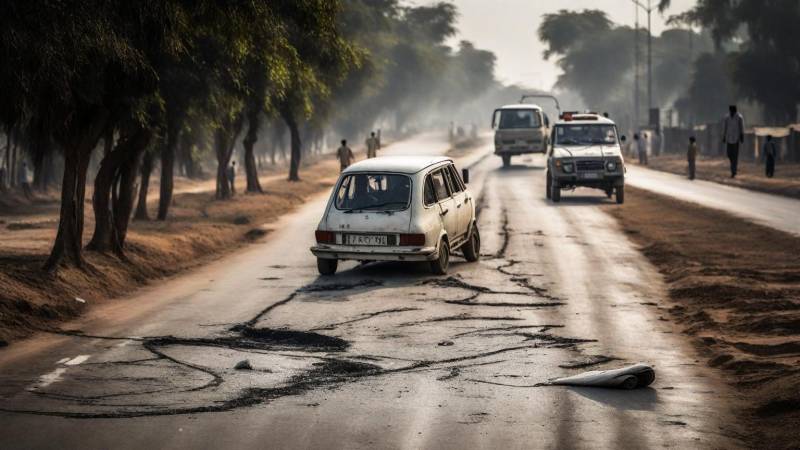
Days after six members of a family were killed in a high-speed chase by an underage, unlicensed driver, a court in Lahore termed driving vehicles without a licence equivalent to giving people a killing machine.
This was stated as a single-member bench of the Lahore High Court, comprising Justice Ali Zia Bajwa, as it heard a case against including sections pertaining to murder in the first information report of the incident. Irfan Hayat Bajwa represented the petitioner who is a minor and the prime suspect. Advocate Rana Muddasir Umar represented the victims.
During the hearing, Justice Bajwa remarked that it was a tragic incident. He went on to add that those driving without licences are driving killing machines.
He asked what the traffic police and police investigators were doing.
At this, Lahore's chief traffic officer (CTO) told the court that some 7.8 million cars are registered in Lahore, but at the same time, there are just 1.3 million licence holders.
The officer further said that they had registered 998 cases of driving without a licence in the city.
Justice Bajwa pointed to a verdict of the court from 2018, which directed that a car cannot be registered by a buyer to their name unless they had a licence.
Addressing the petitioner's representative, he remarked that the request was like asking for prayers to be waived but getting laden with fasts.
The state's representative said they have included Section 7 of the Anti-Terror Act. At this, the court stated the matter should be presented before a division bench. The state's representative noted that before the petition is presented before a division bench, it either needs to be filed afresh or it needs to be amended.
In the public interest, the court directed the CTO to enforce the law against drivers without a licence.
Lawyer Bajwa contended that defence police had registered the case as a traffic accident. But then the caretaker chief minister directed the police to remove sections of traffic accidents and add sections of murder, which was contrary to the principles of fair trial listed in the Constitution. He urged the court not to rob the juvenile suspect of his right to a fair trial by removing the sections of a traffic accident to add charges of murder and terrorism, whereby he goes from being the suspect to becoming a victim.
He further argued that if the case is treated as a traffic accident, it would bode well for both parties as it provides the option for 'diyat' payments. Despite that, he maintained that his client was driving without a licence and should be prosecuted for that. If the minor's father allowed him to drive the car without a licence, then he should be prosecuted under the relevant law as well.
Advocate Bajwa argued that the biggest tragedy was that while laws exist, they are not implemented.
Advocate Umar asked the court whether they would get justice or not. He contended that the suspect had committed seven murders, not six, because one of the women killed in the incident was pregnant at the time.
He stated that the suspect had eliminated his family, but no one from his side even participated in the funerals of the victims on humanitarian grounds.
Umar said that they were not issued a notice for Friday's hearing. Hence, they will present detailed arguments at the next hearing. He further said that the suspect's petition becomes infructuous if anti-terror clauses have been included in the FIR.
Plaintiff Rafaat Ali contended before the court that this was not a traffic accident but a targeted killing.
"My family has been targeted and killed," he cried. "Even if this is a traffic accident, tell me, is the suspect's blood white (emotionless)?"
He said that at no point, whether at the hospital, the graveyard, or his home, did the suspect come to express his regret about the incident. If the incident was an accident, they expressed no grief, nor did they attempt to share his grief.
Instead, Ali claimed that the prosecution mocked him in court. "These people think they can pick a fight with anyone, kill them and then just pay them off," he cried.
Explaining the sequence of events, he said that they were exiting their home after a wedding function when the suspect approached while playing loud music in his car, acting rowdily. He added that the suspect started harassing his daughter-in-law, who did not know the suspect.
He added that before the incident, they had exchanged words with the suspect for 10 to 15 minutes, which is why he crashed his car into theirs.
"The suspect harassed my daughter-in-law. He put his hand through our window to grab her dupatta," Ali claimed.
For me, justice would be if you could bring me back to my dead family. Money has no meaning for me.
On being asked not to mention the alleged harassment of women by the suspect, Ali stated that he had mentioned it the first day and would keep mentioning it.
Ali further stated that no one was pressuring him, but the government had promised to provide him with security, but that has yet to materialise.

